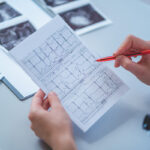
This is a great question! It’s smart that you are having your fast heart rate checked out by a pediatric cardiologist (a doctor who specializes on hearts in children and teens), before you start cross country. You shouldn’t experience any pain or discomfort during the cardiology appointment. A lot of time during your appointment will be talking with the cardiologist. They will ask you and your parent/guardian questions about your medical history as well as your family’s medical history (i.e. your parents, siblings, and grandparents). It’s good before you go to the visit to ask these relatives if anyone has had heart problems, fainting episodes, or sudden deaths before age 50 years old. If you are being seen for an in-person rather than a “virtual” visit, the cardiologist will then do a physical assessment, checking your height, weight, blood pressure, and pulse rate and listening to your heart and lungs.
Once your history and assessment is complete, the cardiologist may recommend no further tests or tests such as a blood count and thyroid levels, an EKG and sometimes a rhythm monitor or ECHO. These are all safe and painless tests. An electrocardiogram (EKG) helps your doctor see the electricity of the heart, read heart rhythms, and picks up on changes. The test is done by attaching stickers with wires to your chest, arms, and legs and it lasts about 3-5min. If your doctor can’t capture your fast heart rate during this test, they may send you home with a portable EKG machine, also known as a Holter monitor. A Holter monitor is a 24-hour EKG that you can wear at home around your chest (with a strap) and it does the same exact thing as normal EKG, but gathers more data over a longer period of time. There is also a very small adhesive patch monitor (such as the Zio Patch) that can record your heart rhythms for 14 days! You might be requested to have an echocardiogram (ECHO), which looks at the structure and function of your heart using an ultrasound machine. It’s a very common test used for people of all ages and completely painless. Remember the cardiologist will listen closely to the symptoms you have had and may decide that you don’t need any tests! Also, it’s important to write down any questions you may have for the cardiologist, before your appointment. It also may be helpful to know exactly when you feel your heart rate speeding up so that your doctor can best help you. Good luck!
 Young Men's Health
Young Men's Health